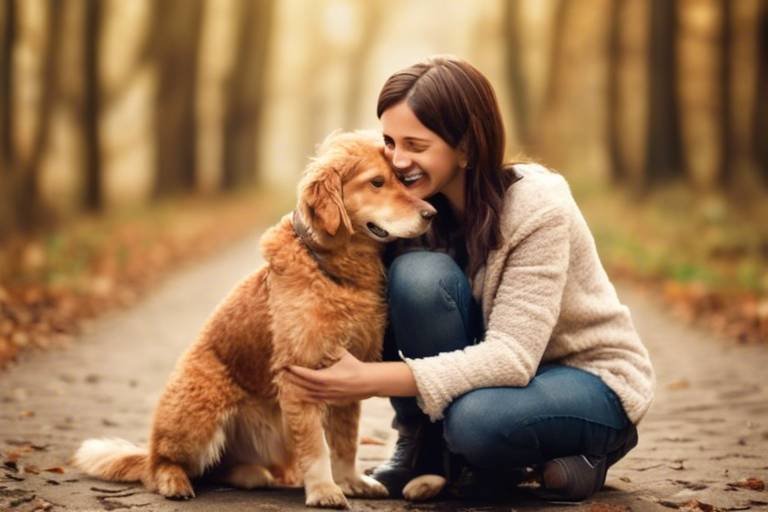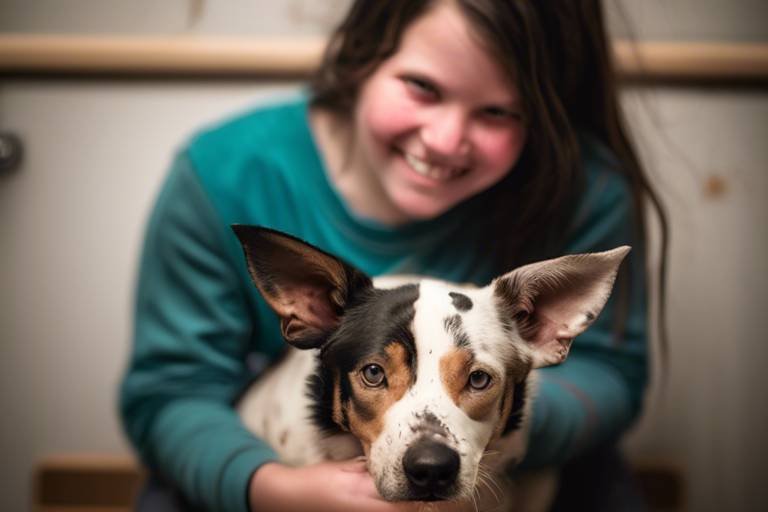How to Build a Network of Support for Adopted Pets
When you adopt a pet, you're not just bringing home a furry friend; you're also stepping into a vibrant community filled with fellow pet lovers who share similar experiences, challenges, and joys. Building a network of support for adopted pets is essential for both the animals and their owners. It’s like creating a safety net that ensures you have access to resources, advice, and companionship throughout your journey. Imagine the feeling of having a group of people who understand the unique quirks and needs of your adopted pet, ready to lend a helping hand whenever you need it. This article explores effective strategies for creating that supportive community, emphasizing the importance of connections and shared experiences for both pets and their owners.
Adopted pets often come with a unique set of challenges. Whether they have a history of trauma, behavioral issues, or simply need time to adjust to their new environment, recognizing their specific needs is crucial. It's like learning a new language; you need to understand their signals and behaviors to foster a supportive environment that promotes their well-being and successful integration into your home. Take the time to observe your pet's body language, vocalizations, and habits. This understanding will not only help you meet their needs but also connect you with other pet owners who may have faced similar challenges.
Local support groups can be a treasure trove of valuable resources and connections for pet owners. These groups often share experiences, advice, and can help in finding services tailored to adopted pets. Think of it as joining a club where everyone speaks the same language—your love for animals. You can find local support groups through community centers, animal shelters, or even social media. Engaging with these groups can provide you with a wealth of information, from training tips to recommendations for pet-friendly businesses in your area.
The internet offers a plethora of online communities and forums where pet owners can connect, share stories, and seek advice on caring for their adopted pets. These platforms act as virtual meeting spots where you can find solace in knowing you're not alone in your journey. Websites like Reddit, Facebook, and specialized forums allow you to ask questions, share experiences, and even vent about the challenges of pet ownership. It's like having a 24/7 support group at your fingertips, ready to offer advice or just lend an ear when you need it.
Social media is a powerful tool for building networks. Platforms like Facebook and Instagram host groups dedicated to adopted pets, allowing owners to share experiences and resources. You can find groups specifically focused on certain breeds, age ranges, or even specific issues like anxiety or behavioral problems. Joining these groups can help you stay informed about upcoming events, adoption drives, and even local meet-ups. Plus, sharing cute photos of your pet is always a great way to connect with fellow pet lovers!
Numerous websites and blogs focus on adopted pets, offering tips, success stories, and a sense of community for pet owners seeking support and information. These resources can be invaluable in your journey as a pet parent. They often feature articles on training, health care, and emotional support, making it easier for you to navigate the complexities of pet ownership. Bookmark a few of your favorites, and you’ll always have a go-to source of inspiration and guidance.
Veterinary clinics often provide resources and support for adopted pets. Building a relationship with local vets can help owners access necessary medical care and advice. Your vet can be a key player in your support network, offering insights into your pet’s health and behavior. Regular visits not only ensure your pet remains healthy, but they also provide an opportunity to discuss any concerns you may have. Think of your vet as your partner in pet parenting, helping you navigate the ups and downs of caring for your adopted companion.
A supportive home environment is crucial for adopted pets. Understanding their emotional and physical needs can help owners create a safe and nurturing space. This means providing a cozy bed, safe toys, and a quiet spot where they can retreat when feeling overwhelmed. Imagine your home as a sanctuary for your pet, where they can feel secure and loved. By creating such an environment, you lay the foundation for a strong bond between you and your furry friend.
Proper training and socialization are essential for adopted pets. Engaging in training classes can foster a sense of community and provide valuable skills for both pets and owners. These classes are not just about teaching commands; they’re also about building confidence in your pet and helping them learn how to interact with other animals and people. It’s like sending your pet to school, where they can make friends and learn the ropes of being a good companion.
Regular veterinary check-ups ensure that adopted pets remain healthy. Establishing a routine with a veterinarian can provide peace of mind and support for pet owners. Just like we need our annual check-ups, our pets benefit from regular health assessments to catch any potential issues early. This proactive approach not only keeps your pet healthy but also strengthens the bond between you and your veterinarian, creating a reliable support system for your pet’s health.
Engaging with the local community can enhance the support network for adopted pets. Participation in events and activities fosters connections and promotes awareness about the needs of adopted animals. Look for local pet fairs, adoption events, or community gatherings that focus on animal welfare. These events are a fantastic way to meet other pet owners, share experiences, and even find new resources. Plus, they often feature fun activities for pets, making them a great outing for you and your furry friend!
- What are the best ways to socialize an adopted pet? Start by introducing your pet to new environments gradually, allowing them to explore at their own pace. Consider enrolling in training classes or group playdates with other pets.
- How can I find local support groups for pet owners? Check with local animal shelters, community centers, and social media platforms for groups dedicated to pet adoption and care.
- What should I do if my adopted pet shows signs of anxiety? Consult with your veterinarian for advice on behavioral training and consider creating a safe space in your home where your pet can retreat when feeling overwhelmed.

Understanding the Needs of Adopted Pets
This article explores effective strategies for creating a supportive community around adopted pets, emphasizing the importance of resources, connections, and shared experiences for both pets and their owners.
Adopted pets often come with a unique set of challenges that can vary widely depending on their background, breed, and individual personality. Understanding these needs is crucial for creating a supportive environment that promotes their well-being. For instance, many adopted pets may have experienced trauma or neglect in their previous homes, leading to behavioral issues such as anxiety or fearfulness. This is where a compassionate approach becomes essential.
When you bring an adopted pet into your home, it’s important to recognize that they may require more than just food, water, and shelter. They need a nurturing environment that caters to their emotional and physical needs. Here are some key aspects to consider:
- Emotional Support: Just like humans, pets thrive on emotional connections. Spending quality time with them can help build trust and reduce anxiety.
- Physical Activity: Regular exercise is vital for their physical health. Different breeds have varying energy levels, so it’s important to tailor activities to fit your pet’s needs.
- Socialization: Introducing your pet to new experiences, people, and other animals can help them become well-adjusted and confident.
Additionally, it's crucial to be aware of any specific health issues that might affect your adopted pet. Some breeds are predisposed to certain health conditions, while others may have lingering issues from their past. Regular veterinary check-ups can help identify and manage these concerns early on. Building a relationship with your veterinarian can also provide you with tailored advice on how to best care for your new furry friend.
Moreover, creating a predictable routine can significantly benefit adopted pets. Pets often find comfort in knowing what to expect. Feeding them at the same times each day, establishing a consistent walking schedule, and setting aside dedicated playtime can help them feel secure in their new environment. Think of it as giving them a roadmap to navigate their new life, which can be incredibly reassuring.
In summary, understanding the needs of adopted pets involves a holistic approach that encompasses emotional support, physical activity, socialization, and health management. By recognizing and addressing these needs, you will not only foster a loving environment but also set the stage for a successful and fulfilling relationship with your adopted pet.
Local support groups can provide valuable resources and connections for pet owners. These groups often share experiences, advice, and can help in finding services tailored to adopted pets.
The internet offers a plethora of online communities and forums where pet owners can connect, share stories, and seek advice on caring for their adopted pets.
Social media is a powerful tool for building networks. Platforms like Facebook and Instagram host groups dedicated to adopted pets, allowing owners to share experiences and resources.
Numerous websites and blogs focus on adopted pets, offering tips, success stories, and a sense of community for pet owners seeking support and information.
Veterinary clinics often provide resources and support for adopted pets. Building a relationship with local vets can help owners access necessary medical care and advice.
A supportive home environment is crucial for adopted pets. Understanding their emotional and physical needs can help owners create a safe and nurturing space.
Proper training and socialization are essential for adopted pets. Engaging in training classes can foster a sense of community and provide valuable skills for both pets and owners.
Regular veterinary check-ups ensure that adopted pets remain healthy. Establishing a routine with a veterinarian can provide peace of mind and support for pet owners.
Engaging with the local community can enhance the support network for adopted pets. Participation in events and activities fosters connections and promotes awareness about the needs of adopted animals.
Q1: What should I do if my adopted pet shows signs of anxiety?
A: It's important to be patient and provide a calm environment. Consider consulting a veterinarian or a pet behaviorist for tailored advice.
Q2: How can I find local support groups for pet owners?
A: Check community bulletin boards, local animal shelters, or social media platforms for groups dedicated to pet owners.
Q3: Are there specific training programs for adopted pets?
A: Yes, many local trainers offer programs specifically designed for adopted pets, focusing on their unique needs and behaviors.

Finding Local Support Groups
When it comes to adopting a pet, the journey doesn't end when you bring them home. In fact, it’s just the beginning! Finding local support groups can be a game-changer for both you and your newly adopted furry friend. These groups serve as a hub of resources, advice, and shared experiences that can make the transition smoother and more enjoyable. Think of them as a safety net where you can find comfort and guidance, especially during challenging times.
Local support groups often consist of fellow pet owners who understand the unique challenges that come with adopting a pet. They can provide insights into everything from behavioral issues to dietary needs, ensuring that you’re not navigating this journey alone. Many of these groups organize regular meet-ups, which can be a fantastic opportunity to socialize your pet and connect with other passionate pet owners. You might even discover a new best friend—both for yourself and your pet!
To find these local support groups, start by checking out community centers, animal shelters, or pet stores in your area. They often have bulletin boards or websites where local events and groups are advertised. Additionally, consider joining local online platforms like Facebook or Meetup, where you can search for groups focused on adopted pets. Here’s a quick rundown of where to look:
- Community Centers: They often host pet-related events and can connect you with local groups.
- Animal Shelters: Many shelters have support groups for new pet owners.
- Pet Stores: Local pet stores frequently have information on training classes and community events.
In addition to in-person groups, don't overlook the power of online communities. They can be a treasure trove of information, offering a platform to ask questions and share experiences without the geographical limitations. Whether you prefer face-to-face interactions or virtual connections, the key is to seek out a community that resonates with you. Remember, the more you engage with these groups, the more support you'll gather, making the journey of pet ownership not just manageable, but truly fulfilling.
So, don’t hesitate! Dive into your local community, explore the resources available, and remember that building a strong network of support is not just beneficial for you, but also for your adopted pet’s happiness and well-being.
Online Communities and Forums
In today's digital age, the internet has become a vibrant hub for pet owners to connect, share stories, and seek advice about their adopted furry companions. Online communities and forums serve as invaluable resources, offering a platform where individuals can unite over their shared love for pets. These spaces are not just about exchanging tips; they are about building relationships and providing emotional support during the challenges of pet ownership. Imagine walking into a virtual room filled with people who understand the unique struggles and joys of adopting a pet—it's both comforting and empowering.
One of the greatest advantages of these online platforms is the diversity of experiences. Whether you have a timid rescue dog or a spirited cat, chances are there’s someone out there who has faced similar challenges. Engaging in discussions can lead to discovering effective training techniques, behavioral insights, and even heartwarming success stories that inspire hope. For instance, many forums allow users to post specific questions, and the community often rallies to provide answers based on their personal experiences. This kind of support can be a game changer, especially for new pet owners who may feel overwhelmed.
Moreover, online communities often host virtual events, webinars, and Q&A sessions with experts in animal care. These events can cover a range of topics, from nutrition to behavioral training, and provide a wealth of knowledge that pet owners can apply in their everyday lives. Additionally, many of these platforms have sections dedicated to local meet-ups, where pet owners can connect in person, fostering a sense of camaraderie that extends beyond the screen. Who wouldn’t want to attend a local park gathering filled with fellow pet lovers?
In essence, online communities and forums are not just about finding information; they are about creating a supportive network that enriches the lives of adopted pets and their owners. By sharing experiences, offering advice, and connecting with others, pet owners can navigate the complexities of pet adoption with greater confidence and joy. So, if you haven’t already, dive into these online spaces—your new community awaits!
- What types of online communities are available for pet owners? There are various forums, Facebook groups, and dedicated websites focused on pet adoption and care.
- How can I find a suitable online community? Look for groups that align with your pet's needs, whether it's breed-specific or focused on certain behavioral issues.
- Can online communities help with training my adopted pet? Absolutely! Many forums offer advice on training techniques and can even connect you with local trainers.
- What are the benefits of engaging in online forums? Engaging in these communities provides emotional support, practical advice, and a sense of belonging among fellow pet owners.
Social Media Platforms
In today's digital age, have become invaluable tools for pet owners, especially those who have adopted pets. These platforms not only allow you to connect with friends and family but also open doors to a vibrant community of fellow pet lovers who share your passion and challenges. Imagine scrolling through your feed and seeing heartwarming stories of other adopted pets, tips on care, or even local adoption events. It's like having a supportive family right at your fingertips!
Platforms like Facebook, Instagram, and Twitter are teeming with groups and pages dedicated to adopted pets. Joining these groups can be a game-changer. You can find advice on how to deal with behavioral issues, recommendations for pet-friendly services, or even just a place to vent about the struggles of pet ownership. For instance, Facebook has numerous groups where members share their experiences, post photos, and engage in discussions about everything from training tips to heartwarming success stories.
Instagram, on the other hand, is perfect for visual storytelling. You can follow accounts that focus on adopted pets, showcasing their journeys from rescue to forever homes. This not only provides inspiration but also creates a sense of belonging. Many users share their daily lives with their pets, which can be incredibly uplifting. Seeing how other adopted pets thrive can motivate you to continue providing the best for your furry friend.
Moreover, social media can be a powerful platform for raising awareness about the importance of adoption. By sharing your own experiences and the joy of having an adopted pet, you can inspire others to consider adoption. It’s a ripple effect—one story can lead to another adoption, creating a wave of positive change in the community. Additionally, many organizations use social media to promote adoptable pets, making it easier for potential adopters to find their new best friend.
However, it’s essential to engage mindfully. While social media can offer a wealth of information, not all advice is created equal. Always cross-reference tips and suggestions with reputable sources or consult with your veterinarian. And remember, the best part of these platforms is the community aspect. Don’t hesitate to share your own stories, ask questions, and connect with others. You might just find that the support you receive is as comforting as a warm cuddle from your adopted pet!
Dedicated Websites and Blogs
In today's digital age, have become vital resources for pet owners, especially those who have adopted pets. These platforms not only offer a wealth of information but also create a sense of community among pet lovers. Imagine having a place where you can find everything from training tips to heartwarming success stories, all tailored to the unique needs of adopted animals. It's like having a supportive friend who understands the challenges you face and provides guidance along the way.
Many of these websites and blogs are run by fellow pet owners, animal behaviorists, and veterinarians who are passionate about animal welfare. They share their experiences, offer advice, and provide insights that can help you navigate the journey of pet adoption. For instance, you might come across blogs that detail the emotional challenges adopted pets face and how to address them, or websites that list local resources for training and veterinary care.
Some popular dedicated websites and blogs include:
- The Dodo: A site that features uplifting stories about pets and their journeys, including adoption tales that can inspire and motivate.
- Petfinder: Not only does it help you find pets to adopt, but it also has a blog filled with resources for new pet owners.
- Adopt a Pet: This website provides tips and articles specifically focusing on the needs of adopted pets, including health, training, and socialization.
These platforms often encourage interaction, allowing you to comment on posts, ask questions, and share your own experiences. This interaction fosters a vibrant community where pet owners can connect and support each other. You might even find local meetups organized through these blogs, where you can meet other pet owners in person, share stories, and learn from one another.
In addition to personal stories and advice, many of these websites also feature resources such as downloadable guides, checklists for new pet owners, and links to local services. These resources can be invaluable, especially for first-time adopters who may feel overwhelmed. They provide a roadmap to help you ensure that your adopted pet receives the best care possible.
So, if you're looking to build a network of support for your adopted pet, don't underestimate the power of dedicated websites and blogs. They are more than just sources of information; they are communities filled with empathy, knowledge, and shared experiences that can make your journey as a pet owner much more enjoyable and fulfilling.
Q: How can I find the best websites and blogs for adopted pets?
A: Start by searching for keywords like "adopted pet care" or "pet adoption blogs." Look for platforms that have active communities and regularly updated content.
Q: Are there any costs associated with using these websites?
A: Most websites and blogs are free to access. However, some may offer premium content or services for a fee.
Q: Can I contribute my own experiences to these blogs?
A: Many blogs welcome guest posts and shared experiences. Check their submission guidelines to see how you can contribute.
Local Veterinary Resources
When it comes to adopting a pet, one of the most critical aspects of ensuring their well-being is establishing a connection with local veterinary resources. These professionals are not just here to provide medical care; they can become invaluable allies in your journey as a pet owner. Think of your veterinarian as your pet's personal health coach, guiding you through the ups and downs of your furry friend's life. Having a trusted vet by your side can make all the difference in addressing any health concerns, providing preventative care, and ensuring your pet leads a happy, healthy life.
Local veterinary clinics often offer a variety of services tailored specifically for adopted pets. Many clinics have experience working with animals that come from shelters or rescue organizations, which means they understand the unique challenges these pets may face. From behavioral issues to health screenings, your vet can provide insights and recommendations that are crucial in your pet's adjustment period. It’s essential to establish a rapport with your veterinarian, as they will be your go-to resource for any questions you may have about your pet's health.
Moreover, many veterinary clinics host community events, such as vaccination drives or educational workshops, which can be a fantastic opportunity for you to meet other pet owners. These gatherings not only provide essential services but also foster a sense of community among local pet lovers. Engaging in such activities can help you build a network of support, where you can share experiences, advice, and even find playmates for your adopted pet.
In addition to general veterinary services, consider looking for clinics that offer specialized care for adopted pets. Some vets may focus on behavioral therapy, while others might provide holistic treatments that can benefit pets with specific needs. It's worth asking your vet about any additional resources they recommend, such as trainers, nutritionists, or pet behaviorists. This way, you can create a comprehensive care plan that addresses all aspects of your pet's well-being.
To help you navigate the various local veterinary resources, here’s a quick overview of what to look for:
| Resource Type | Description | Example Services |
|---|---|---|
| General Veterinary Clinics | Provide routine check-ups and vaccinations. | Annual exams, vaccinations, spaying/neutering. |
| Emergency Animal Hospitals | Available for urgent care outside regular hours. | 24/7 emergency services, critical care. |
| Behavioral Specialists | Focus on training and behavioral issues. | Training classes, behavior modification. |
| Holistic Veterinarians | Offer alternative treatments and preventive care. | Acupuncture, nutrition counseling, herbal medicine. |
In summary, building a relationship with local veterinary resources is an essential step in creating a supportive environment for your adopted pet. These professionals can provide not only medical care but also guidance and community connections that will benefit both you and your furry friend. So, take the time to research and reach out to local vets, and don’t hesitate to ask questions. Your pet’s health and happiness depend on it!
1. How do I choose the right veterinarian for my adopted pet?
Choosing the right veterinarian involves researching local clinics, reading reviews, and visiting the facilities to see if they align with your needs and values. Ask about their experience with adopted pets specifically.
2. What should I expect during my pet’s first vet visit?
During the first visit, the vet will conduct a thorough examination, discuss your pet's history, and may recommend vaccinations or tests to ensure they are healthy.
3. How often should I take my adopted pet to the vet?
Generally, annual check-ups are recommended, but puppies and kittens may need more frequent visits for vaccinations and developmental checks. Always consult your vet for a personalized schedule.
4. Are there any low-cost veterinary resources available for adopted pets?
Yes, many communities offer low-cost clinics or programs for adopted pets. Check with local shelters or rescue organizations for recommendations.

Creating a Supportive Home Environment
When you bring an adopted pet into your home, you’re not just adding a furry friend to your family; you’re also taking on the responsibility of creating a supportive home environment. This means understanding and catering to their unique emotional and physical needs. Just like you wouldn't move into a new place without making it feel like home, your adopted pet deserves the same consideration. Think of your home as a sanctuary where your pet can feel safe, loved, and secure. It’s essential to establish a routine that helps them settle in and feel comfortable.
One of the first steps in creating this nurturing space is to designate a cozy area just for your pet. This could be a specific corner of the living room, a comfy bed in your bedroom, or even a quiet nook in the hallway. Make sure this space is equipped with their favorite toys, a blanket, and a water bowl. This area will serve as their safe haven, a place where they can retreat when they feel overwhelmed or just need a moment to themselves. Remember, just like us, pets also need their personal space to recharge!
Furthermore, it's crucial to understand that adopted pets may have had different experiences before coming to your home, which can affect their behavior. For instance, some may be shy or anxious, while others might be overly energetic. Engaging in gentle training sessions can help them adjust. Positive reinforcement techniques, such as treats and praise, can work wonders. It's like having a conversation with them, building trust and understanding through consistent communication.
Another vital aspect of creating a supportive environment is ensuring that your home is safe. This means pet-proofing your space by removing any hazardous items that could pose a threat. Think of it as child-proofing, but for your four-legged friend! Secure loose wires, keep dangerous chemicals out of reach, and ensure that windows and balconies are safe. The goal is to create a space where your pet can explore freely without the risk of injury.
Moreover, it’s essential to maintain a healthy routine for your adopted pet. This includes regular feeding times, exercise, and playtime. Just like you might schedule gym sessions or meal prep, your pet thrives on routine. Establishing a predictable schedule helps them feel more secure and can mitigate anxiety. Plus, regular exercise is a fantastic way to bond with your pet and keep them healthy. Whether it’s a daily walk, a game of fetch, or simply some playtime in the yard, these activities are essential for their well-being.
Lastly, don’t underestimate the power of socialization. Introducing your pet to new experiences, people, and other animals can help them become well-adjusted members of your family. Consider joining local pet groups or attending community events focused on pets. This not only benefits your pet but also allows you to connect with other pet owners, sharing tips and experiences that can further enhance your support network.
In summary, creating a supportive home environment for your adopted pet involves understanding their needs, providing a safe space, maintaining a healthy routine, and encouraging socialization. By doing so, you’re not just enhancing their quality of life; you’re also enriching your own experience as a pet owner. After all, the bond you build with your adopted pet is one of the most rewarding relationships you’ll ever have!
- What should I do if my adopted pet is anxious?
If your pet shows signs of anxiety, create a safe space for them and consider consulting a veterinarian or a pet behaviorist for tailored advice. - How can I help my pet adjust to their new home?
Establish a routine, provide a safe space, and engage in positive reinforcement training to help them feel secure and comfortable. - Is socialization really necessary for adopted pets?
Yes! Socialization helps them adapt to their new environment and can prevent behavioral issues in the future.
Training and Socialization
When you bring an adopted pet into your home, you're not just welcoming a new furry friend; you're embarking on an exciting journey of . This journey is crucial for helping your pet adjust to their new environment and ensuring they develop into well-rounded companions. Just like us, pets thrive in environments where they feel safe and understood. Imagine being in a new place, surrounded by unfamiliar faces and sounds—wouldn't you want someone to guide you through it?
Training is more than just teaching your pet to sit or stay; it’s about building a strong bond between you and your furry friend. Engaging in training classes not only equips your pet with essential skills but also creates a sense of community among pet owners. You’ll find yourself surrounded by others who share your passion for pets, making it a rewarding experience for both you and your adopted companion. Plus, it’s a fantastic way to learn from each other’s experiences and challenges.
Socialization, on the other hand, is equally important. It helps your pet become accustomed to different environments, people, and other animals. A well-socialized pet is often more confident and less fearful, which can significantly reduce behavioral issues down the line. Think of socialization as a way for your pet to build their own network of friends—just like you do at a party! The more they interact with different stimuli, the more comfortable they will be in various situations.
To effectively train and socialize your adopted pet, consider the following strategies:
- Start Early: If your pet is a puppy or a kitten, begin training and socialization as soon as possible. Young animals are generally more adaptable.
- Positive Reinforcement: Use treats, praise, and playtime to reward good behavior. This approach encourages your pet to repeat those behaviors.
- Expose Them to New Experiences: Gradually introduce your pet to different environments, sounds, and people. The more varied their experiences, the more confident they will become.
- Attend Classes: Look for local training classes specifically designed for adopted pets. These classes often focus on socialization and can be a great way for you and your pet to meet others.
Remember, patience is key! Every pet is unique, and some may take longer to adjust than others. Celebrate the small victories along the way, and don't hesitate to seek advice from trainers or fellow pet owners. The journey of training and socialization not only enriches your pet's life but also strengthens your bond, making your relationship even more special.
Q: How long does training take?
A: Training duration varies by pet and the complexity of the behaviors being taught. Consistent short sessions (about 5-10 minutes) are often more effective than longer ones.
Q: Can older pets be trained?
A: Absolutely! While older pets may take longer to learn new tricks, they can still benefit from training and socialization.
Q: What if my pet is scared of new experiences?
A: Take it slow! Gradually expose them to new experiences at their own pace, ensuring they feel safe and secure.
Regular Health Check-ups
When it comes to the health of our furry friends, are absolutely vital. Just like us, pets can develop health issues that may not be immediately apparent. These check-ups allow veterinarians to catch potential problems early, ensuring that your adopted pet lives a long, happy, and healthy life. Think of it as a routine maintenance check for your car; you wouldn’t wait until the engine starts sputtering to take it in for service, right? The same logic applies to our pets.
During these visits, your vet will conduct a thorough examination that typically includes:
- Checking vital signs like heart rate and temperature
- Examining the eyes, ears, and mouth for any signs of trouble
- Assessing weight and body condition
- Administering vaccinations and preventive treatments
Moreover, establishing a routine with a veterinarian can be incredibly beneficial. Not only does it provide peace of mind for you as a pet owner, but it also helps your pet become comfortable with vet visits. This familiarity can reduce anxiety during check-ups, making the experience smoother for both you and your furry companion. So, how often should you schedule these visits? For young pets, a check-up every 3 to 4 weeks is typical, while adult pets usually require a visit at least once a year. Senior pets, on the other hand, might need to be seen more frequently, perhaps every six months.
Another aspect to consider is that regular check-ups allow you to build a relationship with your vet. This relationship can be invaluable, especially if your pet has specific needs due to their background or past experiences. Your vet can offer tailored advice and support, ensuring that you have all the resources you need to care for your adopted pet effectively. Remember, a healthy pet is a happy pet, and investing in their health through regular check-ups is one of the best things you can do as a responsible pet owner.
In conclusion, don’t overlook the importance of regular health check-ups. They are not just a formality; they are a crucial part of your pet's overall well-being. By prioritizing these visits, you are not only ensuring your pet's health but also creating a strong foundation for a loving and supportive home environment. After all, our pets deserve the best care we can provide!
1. How often should I take my adopted pet to the vet?
Most pets should have a check-up at least once a year. However, young and senior pets may require more frequent visits.
2. What should I expect during a veterinary check-up?
Expect a thorough examination that includes checking vital signs, assessing weight, and possibly administering vaccinations.
3. Can I establish a relationship with my vet?
Absolutely! Building a relationship with your veterinarian can enhance the care your pet receives and provide you with valuable advice tailored to your pet’s needs.
4. What if my pet is anxious about vet visits?
Talk to your vet about your pet's anxiety. They can provide tips and strategies to help make the experience less stressful for your pet.

Engaging with the Community
Engaging with your local community is not just a nice-to-have; it’s a vital part of building a support network for adopted pets. Think of it as creating a safety net that not only helps your furry friend but also enriches your life as a pet owner. Have you ever noticed how much easier it is to navigate challenges when you have a group of like-minded individuals by your side? That's exactly what community engagement can offer. By participating in local events and activities, you can foster connections that promote awareness about the unique needs of adopted animals.
One of the most rewarding ways to engage with your community is to participate in pet adoption events. These gatherings not only showcase adorable pets looking for homes but also create a platform for current pet owners to share their experiences. Imagine walking into a bustling park filled with wagging tails and happy barks, where you can connect with other pet lovers who understand the journey of adopting a pet. You might even find new friends who share similar stories, challenges, and triumphs. Plus, these events often feature local shelters and rescue organizations, providing you with valuable resources and information.
Another effective way to engage is through volunteer opportunities at local shelters. Volunteering is a fantastic way to give back while also learning more about the needs of adopted pets. You can help with dog walking, cat socialization, or even administrative tasks. Not only do you contribute to the welfare of animals, but you also meet other compassionate individuals who are passionate about making a difference. This sense of camaraderie can lead to lasting friendships and a more robust support system for you and your adopted pet.
Additionally, consider joining or forming a local pet owner’s group. These groups can serve as a hub for sharing resources, organizing playdates, and even hosting training sessions. You might be surprised at how many pet owners are eager to connect and share advice. Whether it’s discussing the best training techniques or exchanging tips on managing behavioral issues, having a group to lean on can make all the difference. Plus, it’s a great way for your pet to socialize and learn from others.
Finally, don’t underestimate the power of social media in community engagement. Platforms like Facebook and Instagram are teeming with groups dedicated to pet adoption and care. By joining these online communities, you can stay updated on local events, share your experiences, and gain insights from others who have walked a similar path. Social media can bridge the gap between virtual and real-life connections, leading to meaningful relationships that extend beyond the screen.
- What are some local events I can participate in to support adopted pets?
Check your local animal shelters, pet stores, and community centers for adoption events, fundraisers, and awareness campaigns. - How can I find a local pet owner’s group?
Search online platforms like Facebook or Meetup, or inquire at your local veterinary clinic or pet store. - What are the benefits of volunteering at a shelter?
Volunteering helps you gain experience, meet fellow animal lovers, and directly contribute to the welfare of pets in need. - Can social media really help build a community for pet owners?
Absolutely! Social media allows you to connect with others, share experiences, and stay informed about local events and resources.
Frequently Asked Questions
- What are the unique needs of adopted pets?
Adopted pets often come with a variety of unique needs, which can include emotional support, specific dietary requirements, and behavioral training. Understanding these needs is crucial for helping them adjust to their new environment and ensuring their overall well-being.
- How can I find local support groups for adopted pets?
Finding local support groups can be as easy as searching online or asking your veterinarian for recommendations. Many communities have organizations dedicated to helping pet owners connect, share experiences, and access resources tailored to the needs of adopted pets.
- Are there online communities for pet owners?
Absolutely! The internet is full of online communities and forums where pet owners can connect. Websites, social media groups, and dedicated forums provide platforms for sharing stories, asking questions, and seeking advice on caring for adopted pets.
- What role do social media platforms play in building a support network?
Social media platforms like Facebook and Instagram are fantastic for creating a network of support. They host numerous groups where pet owners can share experiences, seek advice, and even find resources for their adopted pets, all while connecting with like-minded individuals.
- How important is it to have a local veterinarian for my adopted pet?
Having a local veterinarian is incredibly important for the health and well-being of your adopted pet. Regular check-ups ensure your pet stays healthy, and a good relationship with your vet can provide you with valuable advice tailored to your pet's specific needs.
- What can I do to create a supportive home environment for my adopted pet?
Creating a supportive home environment involves understanding your pet's emotional and physical needs. This includes providing a safe space, engaging in proper training, and ensuring they have a routine that meets their health and wellness requirements.
- How can I engage with my community to support adopted pets?
Engaging with your community can be done through participation in local events, volunteering at shelters, or joining pet-related activities. These interactions not only foster connections but also raise awareness about the needs of adopted animals.
- What are the benefits of training and socialization for adopted pets?
Training and socialization are essential for adopted pets as they help them learn appropriate behaviors and build confidence. Engaging in training classes can also create a sense of community among pet owners, providing support and resources for everyone involved.



















